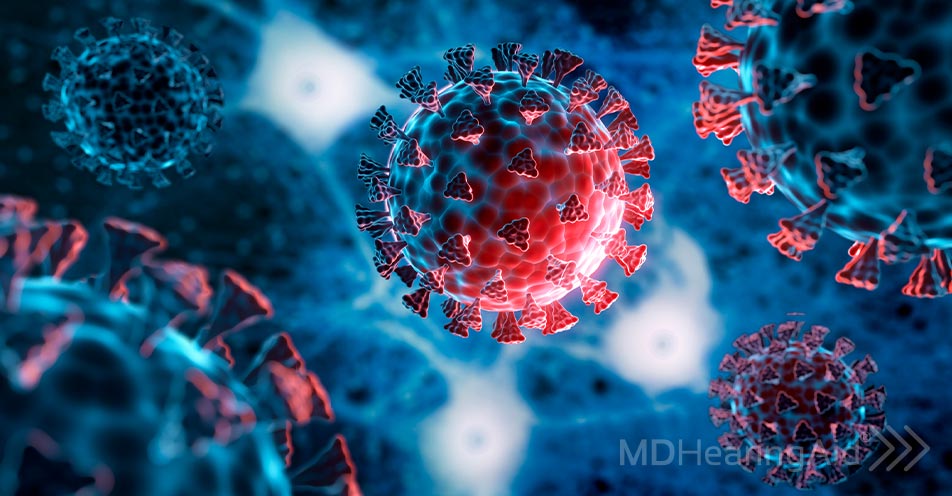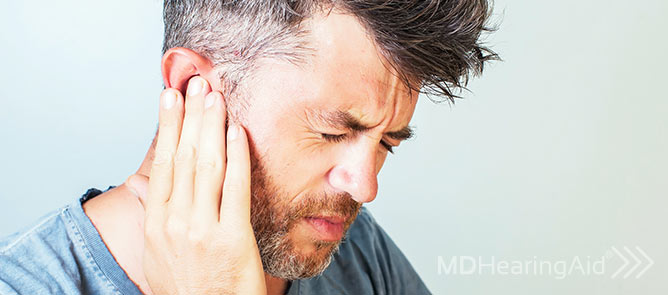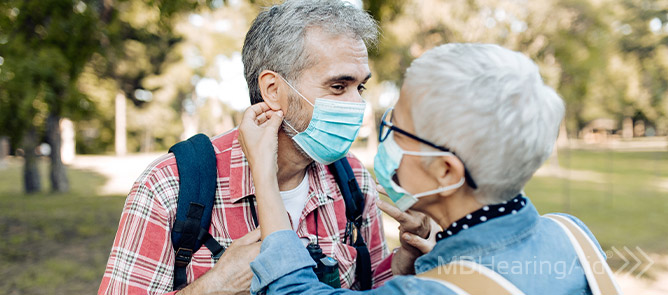Years after the start of the COVID-19 pandemic, scientists and physicians are still learning about the many possible impacts of the novel coronavirus on the human body. Although the primary effect is inflammation of the respiratory tract and lungs, COVID-19 patients have also experienced a variety of other symptoms. These include the well-known loss of taste and smell, fatigue and brain fog, and even “Covid toes”: dark, painful rashes or lesions on the feet.
One lesser-known symptom that has been linked to COVID-19 is hearing loss, as well as other hearing-related conditions such as tinnitus, dizziness, and loss of balance. Although these issues are only temporary for some individuals, others have reported chronic struggles that negatively impact their quality of life. Researchers are still investigating the so-called “long COVID” phenomenon, in which patients report ongoing health problems after recovering from a COVID-19 infection.
In this article, we’ll discuss everything you need to know about Covid and hearing loss: what the science has revealed about this connection, as well as possible treatment options for people with hearing loss.
Hearing Loss after Covid Infection
It’s not surprising that some COVID-19 patients would report hearing problems while ill. Because the COVID-19 virus infects the respiratory tract, the body’s mucous membranes can become stuffy and congested. As a result, fluid can accumulate behind the eardrum in the middle ear, a condition known as otitis media. In most cases, this fluid will naturally dissipate over time as the infection clears up, and the patient’s hearing will improve.
However, a number of COVID-19 patients have reported sustained hearing loss issues during or after the illness. The good news is that cases of long-term hearing loss after COVID-19 infection appear to be rare. Below, we’ll review scientific articles that have investigated the supposed connection between Covid and hearing loss.
One such study is “Sudden irreversible hearing loss post COVID-19,” published in October 2020 in the medical journal BMJ Case Reports. This study discusses the case of a patient who reported sudden hearing loss after a COVID-19 infection.
According to the article, this is the first confirmed case of sudden sensorineural hearing loss (SSNHL) following COVID-19 in the United Kingdom. Sensorineural hearing loss is a type of hearing loss that occurs when there is damage either to the tiny hair cells in your inner ear, or to the auditory nerve.
The patient in this case study was admitted to the hospital after 10 days of COVID-19 symptoms, and was then intubated for 30 days. One week after being transferred out of intensive care, he reported sudden-onset hearing loss and tinnitus in his left ear. Physicians were able to exclude other potential causes of hearing loss through examination and medical imaging. The patient was then treated with oral steroids for one week, which caused his hearing to partially improve.
A larger study, “Persistent self-reported changes in hearing and tinnitus in post-hospitalisation COVID-19 cases,” was published in the International Journal of Audiology in July 2020. The authors note that a link between Covid and hearing loss is plausible, given that other viruses such as measles, mumps, and meningitis are known to cause hearing problems.
This article examined 138 adult COVID-19 patients in the United Kingdom eight weeks after being discharged from the hospital. According to the study, 16 patients (13 percent) reported tinnitus or a decline in hearing after their diagnosis. Of the eight patients with a decline in hearing, only four of them reported that they had a preexisting hearing loss.
An article published in Communications Medicine in October 2021, “Direct SARS-CoV-2 infection of the human inner ear may underlie COVID-19-associated audiovestibular dysfunction,” may help explain why some COVID-19 patients experience long-term hearing loss. This study found that the SARS-CoV-2 virus that causes COVID-19 can indeed infect cells of the inner ear.
The study’s authors extracted hair cells and Schwann cells (large cells in the nervous system that help promote nerve regeneration) from tissue of the inner ear. They then exposed these samples to the SARS-CoV-2 virus, discovering that the virus appeared to have replicated inside the cells. According to the authors, the virus may be able to travel through the Eustachian tube into the middle ear space, which is connected to the inner ear. Another possible route of transmission is the small openings around the olfactory nerves. These openings would allow the virus to enter the brain space and infect the cranial nerves, including the nerve that connects to the inner ear.
The three studies discussed above are part of a growing body of evidence connecting COVID-19 with hearing loss. As of writing, however, no such link has been conclusively established.
Multiple factors make it challenging to study the issue of Covid and hearing loss. For one, severe COVID-19 infection is most likely among older patients, who are also the largest demographic to experience hearing loss. In addition, drugs commonly used to treat COVID-19 such as remdesivir and hydroxychloroquine can be ototoxic, meaning they may impair a person’s hearing or balance.
Regardless of the cause, chronic hearing loss is a condition that shouldn’t be taken lightly. If your hearing loss persists after a COVID-19 infection, you may want to consider visiting a local hearing clinic or consulting with your physician. Patients with hearing loss can often see benefits from wearing hearing aids as a temporary or long-term solution.
Does the Covid Vaccine Cause Hearing Loss?
Given that many people suspect a link between Covid and hearing loss, a related question is to wonder if the COVID-19 vaccine can cause hearing loss. Although there are anecdotal reports of some individuals experiencing hearing loss after being vaccinated, two studies have found no conclusive link between the two.
The first study, “Assessment of Sudden Sensorineural Hearing Loss After COVID-19 Vaccination,” was published in the journal JAMA Otolaryngology–Head & Neck Surgery in February 2022. It looked at 555 cases of SSNHL that had all been reported to the U.S. Centers for Disease Control and Prevention (CDC) and the Vaccine Adverse Event Reporting System (VAERS). All patients had received either the Pfizer, Moderna, or Johnson & Johnson COVID-19 vaccine.
Through statistical analysis, the study’s authors found that the rate of SSNHL among these vaccinated individuals was consistent with the expected levels of SSNHL within the U.S. general population. In addition, the rate of SSNHL reports was consistent among all three vaccines.
In addition, the study examined data from 21 patients who had developed SSNHL within three weeks of receiving a Covid vaccine. Six patients were found to have a history of autoimmune disease, such as eczema, multiple sclerosis, or rheumatoid arthritis. The study also highlighted the curious case of one patient who developed low-frequency SSNHL two weeks after receiving both doses of the Pfizer vaccine.
The second article, “Association Between the BNT162b2 Messenger RNA COVID-19 Vaccine and the Risk of Sudden Sensorineural Hearing Loss,” was also published in the same edition of JAMA Otolaryngology–Head & Neck Surgery in February 2022. This study examined more than 2.6 million recipients of the Pfizer vaccine in Israel.
According to the study, SSNHL had an incidence of 60.77 per 100,000 person-years after the first dose of the Pfizer vaccine, and 56.24 per 100,000 after the second. The authors found that this was slightly higher than the SSNHL incidence rate of 44.46 per 100,000 among the general population in 2019.
This means if you followed 100,000 people for a year after getting a first dose of the vaccine, approximately 61 of them would be expected to develop SSNHL, versus 44 in the general population. Because the impact on public health is very small, along with the good prognosis for patients with SSNHL, they continue to recommend the use of the Pfizer vaccine.
Face Masks and People with Hearing Loss
Beyond the impact of COVID-19 or the Covid vaccine, public health measures to combat the virus can also affect people with hearing loss. In particular, multiple studies have found that the use of face masks can make it more difficult for people with hearing loss to communicate. This is for multiple reasons:
- Face masks can muffle or distort speech.
- The use of face masks makes it impossible to read a person’s lips, which is an essential skill for many people with hearing loss.
- The ear loops on a face mask can physically interfere with certain hearing aid models, such as behind-the-ear (BTE) hearing aids.
- Face masks are often used in combination with other public health measures such as social distancing and plastic barriers, further lowering speech volume.
One such article, “The impact of face masks on the communication of adults with hearing loss during COVID-19 in a clinical setting,” was published in the International Journal of Audiology in July 2021. This study followed 42 people with moderate to severe hearing loss, testing the impact of face coverings on these individuals’ speech perception.
The study found the subjects performed significantly worse on speech perception when their conversation partner was wearing a face mask. In addition, subjects with the most severe hearing loss also performed worse when their partner wore a plastic face shield, which the authors speculated was due to the sound distortion.
A January 2021 article in The Hearing Journal, “Comparison of the Acoustic Effects of Face Masks on Speech,” explicitly measured the impact of each type of facial covering. The study found that surgical, cloth, and N95 masks all caused a reduction in speech volume between 5 and 10 decibels. Masks with a uPVC window performed the worst, reducing high-frequency speech by up to 13 decibels.
Given these findings, there are several pieces of advice that people with hearing loss can follow when in an environment with face coverings:
- Ask your conversation partners to speak slowly and clearly. If possible, move to a quieter environment.
- Use equipment such as a portable hearing aid amplifier, speech-to-text transcription, or even low-tech tools such as a whiteboard or pen and paper, where available.
- Consider using a hearing aid with a “face mask mode” that attempts to adjust for the presence of face coverings.
Conclusion
There are multiple ways to approach the question of Covid and hearing loss. Although the jury is still out, several academic studies have postulated a link between COVID-19 infection and long-term hearing loss. On the other hand, studies have failed to show a significant correlation between hearing loss and COVID-19 vaccines. In addition, people with hearing loss may confront additional challenges adapting to COVID-19 public health measures, such as the use of face masks and social distancing.
If you experience hearing loss and you believe a hearing aid could help, MDHearing is here to assist. More than 500,000 customers have trusted MDHearing with their hearing health. Our hearing aid products have been designed by doctors, tested by audiologists, and registered with the FDA.
Founded by an ENT doctor and headquartered in the Chicagoland area, MDHearing makes it easy for customers to cut out the middleman, directly purchasing the hearing aid device that best fits their needs. We offer a 45-day risk-free trial and top-notch U.S.-based customer service, so you can quickly resolve any questions or concerns.
Ready to get started? Take our 8-minute online hearing test and receive your feedback instantly. Once you’re done, MDHearing’s on-staff audiologists will be available to interpret your results and walk you through the best options for your needs.
Take the FREE, quick, and easy online hearing test today.
TAKE ONLINE HEARING TEST


